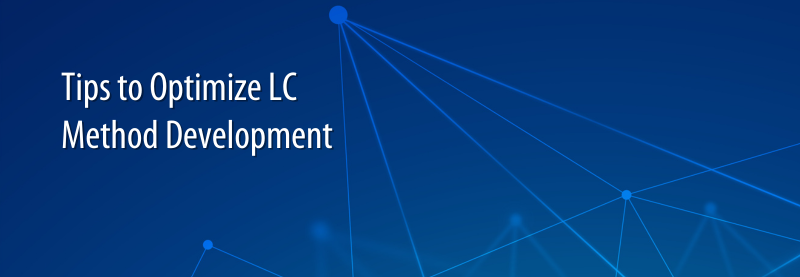
Available Modules

This module series will introduce all common types of sample preparation used in the bioanalytical laboratory space and then will focus primarily on solid-phase extraction (SPE) which yields the highest cleanliness of sample extracts. Gaining a fundamental understanding of how SPE works, what benefits SPE provides, and what SPE devices are available in the laboratory will be a main focus, from learning about reversed-phase and mixed-mode ion exchange retention mechanisms, to selecting a sorbent, device format, and processing method. The available tutorials in this course include:
- The Benefits of Good Sample Preparation
- SPE Retention: Reversed-Phase and Mixed-Mode
- The Electrospray Process and Impact of Common Matrix Ions on an LC-MS Method
- Selecting a Sorbent, Format, and Starting Method
- Before You Load: Sample Matrix and Pre-Treatment
- Designing a Successful Experiment
- Selecting a Sorbent, Format, and Starting Method
START THE COURSE

Size-Exclusion Chromatography (SEC) is a powerful technique for protein characterization that requires an understanding of the principles to be successful. In these Learning Modules, we will discuss the history and science of SEC, its strengths and limitations, and how to get the most from this important analytical technique. We’ll also discuss the analytical challenges with a focus on monoclonal antibody separations and the effective use of LC-based, size-exclusion chromatography to obtain reliable mAb aggregate, monomer, and fragment analyses. The available tutorials in this course include:
- Analytical Challenges and Use of SEC for mAbs
- Principles and Practice of SEC for Reliable Monoclonal Antibody Analyses
- Selecting Appropriate SEC Pore Size for Reliable Protein / Peptide Separations
- Choosing Appropriate SEC Column Size based on LC System and Application Goals
- Considerations to Maximize SEC Column Life
- Developing Robust SEC Methods for Protein Size Variants
START THE COURSE

Successful chromatographic separations are as much about preventing the interactions you don’t want, as it is creating the interactions you need. This course is designed to take you from beginner to advanced in controlling the interactions within your chromatographic separations. It will cover how to improve method robustness through the prevention of analyte loss, with improved confidence in the quality of your data.
The full module includes six tracks, including:
- Introduction to non-specific binding and non-specific adsorption
- Common approaches and newer innovations to prevent non-specific adsorption
- Improving reproducibility and reducing column conditioning through control of non-specific adsorption
- Improving sensitivity and peak shape through control of non-specific adsorption
- Column Selection in a world with non-specific adsorption
- Simplified Method Development with Risk Mitigation against Non-Specific Adsorption
START THE COURSE

Have you ever wondered how the LC column creates a separation? What attributes are important, what do they do, and how to use them to your advantage? This course is designed to take you from beginner to advanced in understanding column selection and method development. It will cover the key aspects of the LC column from the base particle to the bonded phase, and even the hardware.
The full module includes six tracks, including:
- Column Particle technologies: the good, the bad, and the ugly
- Base particles: the key attributes that impact retention
- Solid-core particles: How do they provide higher column efficiency and lower backpressure?
- Ligands: C18, Phenyl, PFP…How to choose?
- What determines the lifetime of the column and how can you extend it?
- The perfect match: Selecting columns to maximize performance on your LC system
START THE COURSE

Effective LC method development is crucial for achieving reliable, high-quality separations. This tutorial series will equip you with practical tools and insights to streamline the process, ensuring flexibility and precision in your workflows. From performance monitoring to optimizing mobile phases and column selection, you’ll gain valuable knowledge to enhance your analytical capabilities
The full tutorial includes six modules, including:
- The first module will cover a simple and easy performance monitoring process that is not tied to a specific assay, allowing more flexibility in testing.
- The second module will look at the different method development approaches.
- The third module looks at the importance and limitations of using both low pH and high pH modified mobile phases as a part of method development.
- The fourth module looks at the different selectivity that can be achieved by using alternate mobile phase strong solvents.
- The fifth module looks at the column stationary phases in more detail.
- The final module brings the topic to instrument contributions on column and assay performance.
START THE COURSE
Registrants to these tutorials are covered by the Eclipse Business Media Privacy Policy. Information you provide will be shared with the sponsors for this content. Eclipse Business Media Ltd may contact you to offer you content based on your specific interests. You may opt-out at any time.